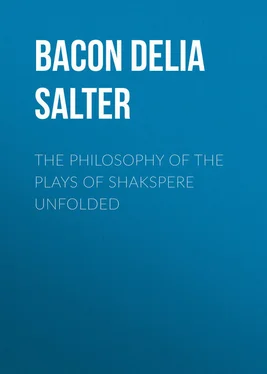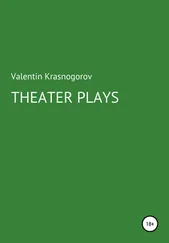Delia Bacon - The Philosophy of the Plays of Shakspere Unfolded
Здесь есть возможность читать онлайн «Delia Bacon - The Philosophy of the Plays of Shakspere Unfolded» — ознакомительный отрывок электронной книги совершенно бесплатно, а после прочтения отрывка купить полную версию. В некоторых случаях можно слушать аудио, скачать через торрент в формате fb2 и присутствует краткое содержание. Жанр: literature_19, foreign_antique, foreign_prose, на английском языке. Описание произведения, (предисловие) а так же отзывы посетителей доступны на портале библиотеки ЛибКат.
- Название:The Philosophy of the Plays of Shakspere Unfolded
- Автор:
- Жанр:
- Год:неизвестен
- ISBN:нет данных
- Рейтинг книги:3 / 5. Голосов: 1
-
Избранное:Добавить в избранное
- Отзывы:
-
Ваша оценка:
- 60
- 1
- 2
- 3
- 4
- 5
The Philosophy of the Plays of Shakspere Unfolded: краткое содержание, описание и аннотация
Предлагаем к чтению аннотацию, описание, краткое содержание или предисловие (зависит от того, что написал сам автор книги «The Philosophy of the Plays of Shakspere Unfolded»). Если вы не нашли необходимую информацию о книге — напишите в комментариях, мы постараемся отыскать её.
The Philosophy of the Plays of Shakspere Unfolded — читать онлайн ознакомительный отрывок
Ниже представлен текст книги, разбитый по страницам. Система сохранения места последней прочитанной страницы, позволяет с удобством читать онлайн бесплатно книгу «The Philosophy of the Plays of Shakspere Unfolded», без необходимости каждый раз заново искать на чём Вы остановились. Поставьте закладку, и сможете в любой момент перейти на страницу, на которой закончили чтение.
Интервал:
Закладка:
But in the part of this work referred to, from which the ensuing extracts are made, it was the life, and not merely the writings of the founders of this school which was produced in evidence of this claim. It was the life in which these disguised ulterior aims show themselves from the first on the historic surface, in the form of great contemporaneous events, events which have determined and shaped the course of the world's history since then; it was the life in which these intents show themselves too boldly on the surface, in which they penetrate the artistic disguise, and betray themselves to the antagonisms which were waiting to crush them; it was the life which combined these antagonisms for its suppression; it was the life and death of the projector and founder of the liberties of the New World, and the obnoxious historian and critic of the tyrannies of the Old, it was the life and death of Sir Walter Raleigh that was produced as the Historical Key to the Elizabethan Art of Tradition. It was the Man of the Globe Theatre, it was the Man in the Tower with his two Hemispheres, it was the modern 'Hercules and his load too,' that made in the original design of it, the Frontispiece of this volume.
'But stay I see thee in the hemisphere
Advanced and made a constellation there.
Shine forth, thou Star of Poets, and with rage
Or influence , chide or cheer the drooping stage,
Which since thy flight from hence hath mourned like night,
And despairs day, but for thy Volume's light.
['To draw no envy Shake-spear on thy name,
Am I thus ample to thy book and fame.' – BEN JONSON.]
The machinery that was necessarily put in operation for the purpose of conducting successfully, under those conditions, any honourable or decent enterprise, presupposes a forethought and skill, a faculty for dramatic arrangement and successful plotting in historic materials, happily so remote from anything which the exigencies of our time have ever suggested to us, that we are not in a position to read at a glance the history of such an age; the history which lies on the surface of such an age when such men – men who are men – are at work in it. These are the Elizabethan men that we have to interpret here, because, though they rest from their labours, their works do follow them – the Elizabethan Men of Letters ; and we must know what that title means before we can read them or their works, before we can ' untie their spell .'
CHAPTER II
'The times, in many cases, give great light to true interpretations.' Advancement of Learning .
'On fair ground
I could beat forty of them.'
'I could myself
Take up a brace of the best of them, yea the two tribunes .'
'But now 'tis odds beyond arithmetic,
And manhood is called foolery when it stands
Against a falling fabric.' — Coriolanus .
The fact that the immemorial liberties of the English PEOPLE, and that idea of human government and society which they brought with them to this island, had been a second time violently overborne and suppressed by a military chieftainship, – one for which the unorganised popular resistance was no match, – that the English People had been a second time 'conquered' – for that is the word which the Elizabethan historian suggests – less than a hundred years before the beginning of the Elizabethan Age, is a fact in history which the great Elizabethan philosopher has contrived to send down to us, along with his philosophical works, as the key to the reading of them. It is a fact with which we are all now more or less familiar, but it is one which the Elizabethan Poet and Philosopher became acquainted with under circumstances calculated to make a much more vivid impression on the sensibilities than the most accurate and vivacious narratives and expositions of it which our time can furnish us.
That this second conquest was unspeakably more degrading than the first had been, inasmuch as it was the conquest of a chartered, constitutional liberty, recovered and established in acts that had made the English history, recovered on battle-fields that were fresh, not in oral tradition only; inasmuch as it was effected in violation of that which made the name of Englishmen, that which made the universally recognised principle of the national life; inasmuch, too, as it was an undivided conquest, the conquest of the single will – the will of the 'one only man' – not unchecked of commons only, unchecked by barons, unchecked by the church, unchecked by council of any kind, the pure arbitrary absolute will, the pure idiosyncrasy, the crowned demon of the lawless , irrational will, unchained and armed with the sword of the common might, and clothed with the divinity of the common right; that this was a conquest unspeakably more debasing than the conquest 'commonly so called,' – this, which left no nobility, – which clasped its collar in open day on the proudest Norman neck, and not on the Saxon only, which left only one nation of slaves and bondmen – that this was a subjugation – that this was a government which the English nation had not before been familiar with, the men whose great life-acts were performed under it did not lack the sensibility and the judgment to perceive.
A more hopeless conquest than the Norman conquest had been, it might also have seemed, regarded in some of the aspects which it presented to the eye of the statesman then; for it was in the division of the former that the element of freedom stole in, it was in the parliaments of that division that the limitation of the feudal monarchy had begun.
But still more fatal was the aspect of it which its effects on the national character were continually obtruding then on the observant eye, – that debasing, deteriorating, demoralising effect which such a government must needs exert on such a nation, a nation of Englishmen, a nation with such memories. The Poet who writes under this government, with an appreciation of the subject quite as lively as that of any more recent historian, speaks of 'the face of men' as a 'motive' – a motive power, a revolutionary force, which ought to be sufficient of itself to raise, if need be, an armed opposition to such a government, and sustain it, too, without the compulsion of an oath to reinforce it; at least, this is one of the three motives which he produces in his conspiracy as motives that ought to suffice to supply the power wanting to effect a change in such a government.
'If not the face of men , The sufferance of our souls, the time's abuse , – If these be motives weak, break of betimes. '
There is no use in attempting a change where such motives are weak.
'Break off betimes ,
And every man hence to his idle bed.'
That this political degradation, and its deteriorating and corrupting influence on the national character, was that which presented itself to the politician's eye at that time as the most fatal aspect of the question, or as the thing most to be deprecated in the continuance of such a state of things, no one who studies carefully the best writings of that time can doubt.
And it must be confessed, that this is an influence which shows itself very palpably, not in the degrading hourly detail only of which the noble mind is, in such circumstances, the suffering witness, and the secretly protesting suffering participator, but in those large events which make the historic record. The England of the Plantagenets, that sturdy England which Henry the Seventh had to conquer, and not its pertinacious choice of colours only, not its fixed determination to have the choosing of the colour of its own 'Roses' merely, but its inveterate idea of the sanctity of ' law ' permeating all the masses – that was a very different England from the England which Henry the Seventh willed to his children; it was a very different England, at least, from the England which Henry the Eighth willed to his .
Читать дальшеИнтервал:
Закладка:
Похожие книги на «The Philosophy of the Plays of Shakspere Unfolded»
Представляем Вашему вниманию похожие книги на «The Philosophy of the Plays of Shakspere Unfolded» списком для выбора. Мы отобрали схожую по названию и смыслу литературу в надежде предоставить читателям больше вариантов отыскать новые, интересные, ещё непрочитанные произведения.
Обсуждение, отзывы о книге «The Philosophy of the Plays of Shakspere Unfolded» и просто собственные мнения читателей. Оставьте ваши комментарии, напишите, что Вы думаете о произведении, его смысле или главных героях. Укажите что конкретно понравилось, а что нет, и почему Вы так считаете.












